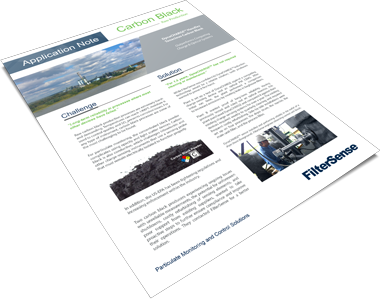Raw carbon black production processes are extremely harsh and demanding. Temperatures can reach 1400°F, moisture is used to control quality, and SO2 presents corrosion issues. For any type of instrument, carbon black processes are some of the most challenging to be found.
For particulate monitoring, the concentrated black powder complicates using opacity and light scatter devices. Carbon black is also conductive, which challenges triboelectric and other charge-sensing instruments that use a sensing probe that must remain electrically isolated to function properly.
In addition, the US-EPA has been tightening regulations and increasing enforcement within the industry.
Two carbon black producers experiencing ongoing issues with unreliable measurements, the potential for unforeseen shutdowns, costly refurbishing of sensing elements, and poor support from existing suppliers, wanted to take proactive steps to further ensure compliance and improve their operations. They contacted FilterSense for a better solution.

